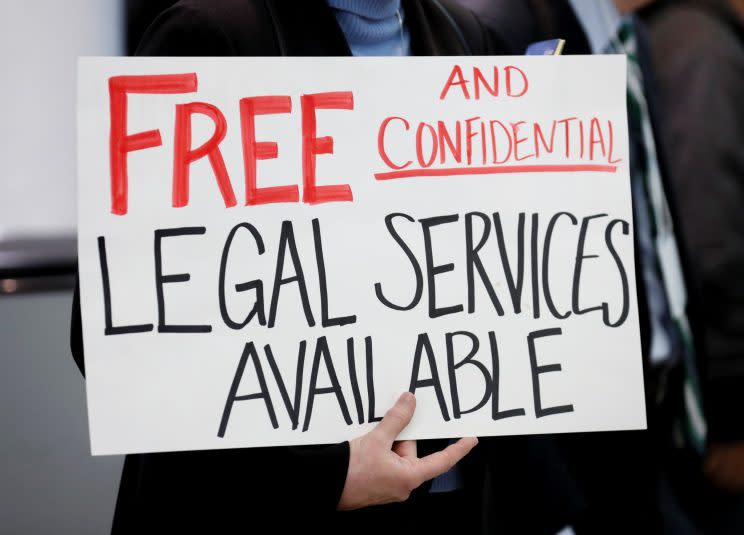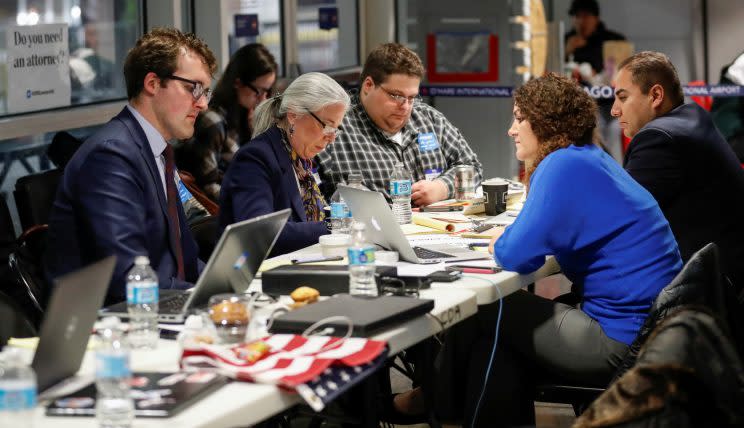Opponents of Trump’s travel ban continue to mount airport defense of immigrants

Across from a McDonald’s in the international terminal of Chicago’s O’Hare airport, a rectangular folding table covered in donated snacks and coffee sits roped off beneath handmade signs advertising free legal services for detained travelers and their families.
The table was first set up in January, as a makeshift headquarters for hundreds of lawyers who’d flocked to the airport after President Trump signed an executive order to halt immigration for citizens of seven Muslim-majority countries and temporarily block all refugees from entering the U.S.
For more than four months, attorneys from throughout Chicagoland have taken shifts at the table, maintaining a nearly round-the-clock presence at the airport, even after federal judges moved to freeze both the initial order and a revised version, signed by the president in March.
In part, that’s because President Trump shows no signs of backing down on his desire to impose harsh travel restrictions.
People, the lawyers and the courts can call it whatever they want, but I am calling it what we need and what it is, a TRAVEL BAN!
— Donald J. Trump (@realDonaldTrump) June 5, 2017
“While we’ve seen a huge decline [in] reported cases of detention and deportation from the airport, it’s still happening,” said Sufyan Sohel, deputy director and counsel for the Chicago chapter of the Council on American-Islamic Relations, or CAIR.
Sohel explained that in mid-February, “sometime between the two travel bans,” CAIR Chicago stepped in to offer administrative assistance to the grassroots legal team operating out of O’Hare.
“They realized they couldn’t do this alone,” he said, adding that CAIR “quickly realized it wasn’t only individuals from those seven, later six countries, who’ve been affected by those policies.”
In addition to providing volunteer attorneys with malpractice insurance, CAIR Chicago created an online registry where concerned travelers or their relatives can enter their flight information to ensure that an attorney will be ready and waiting to assist them upon arrival.
More than 652 people have submitted their travel concerns through CAIR’S website, the Travel Assistance Project, or TAP.
While TAP caters specifically to those flying into Chicago, a similar service called Airport Lawyer, created by two attorneys in Seattle offers to connect travelers and their families with attorneys at a variety of airports throughout the U.S.

The lawyers themselves continue to coordinate with the remaining core volunteers to ensure that someone is still on the ground at O’Hare every day to provide guidance to those who need it. Meanwhile, Sohel said, CAIR Chicago is focused on longer-term strategies to sustain the broader legal community’s engagement on immigration and asylum issues, as Trump seeks to revive his original travel ban in the Supreme Court.
What started as a listserve of more than 1,000 Chicago-based volunteers has since dwindled to about 200 attorneys “who are actively engaged,” said Sohel. “We don’t want to waste that energy and interest.”
He said CAIR Chicago is currently working to set up a hotline for travelers and their families so “they can get relief if there’s no attorney there.”
“God forbid a new travel ban comes, or the Supreme Court reverses the lower court’s decision … we have the infrastructure in place to provide that relief,” he said.
_____
Read more from Yahoo News:


